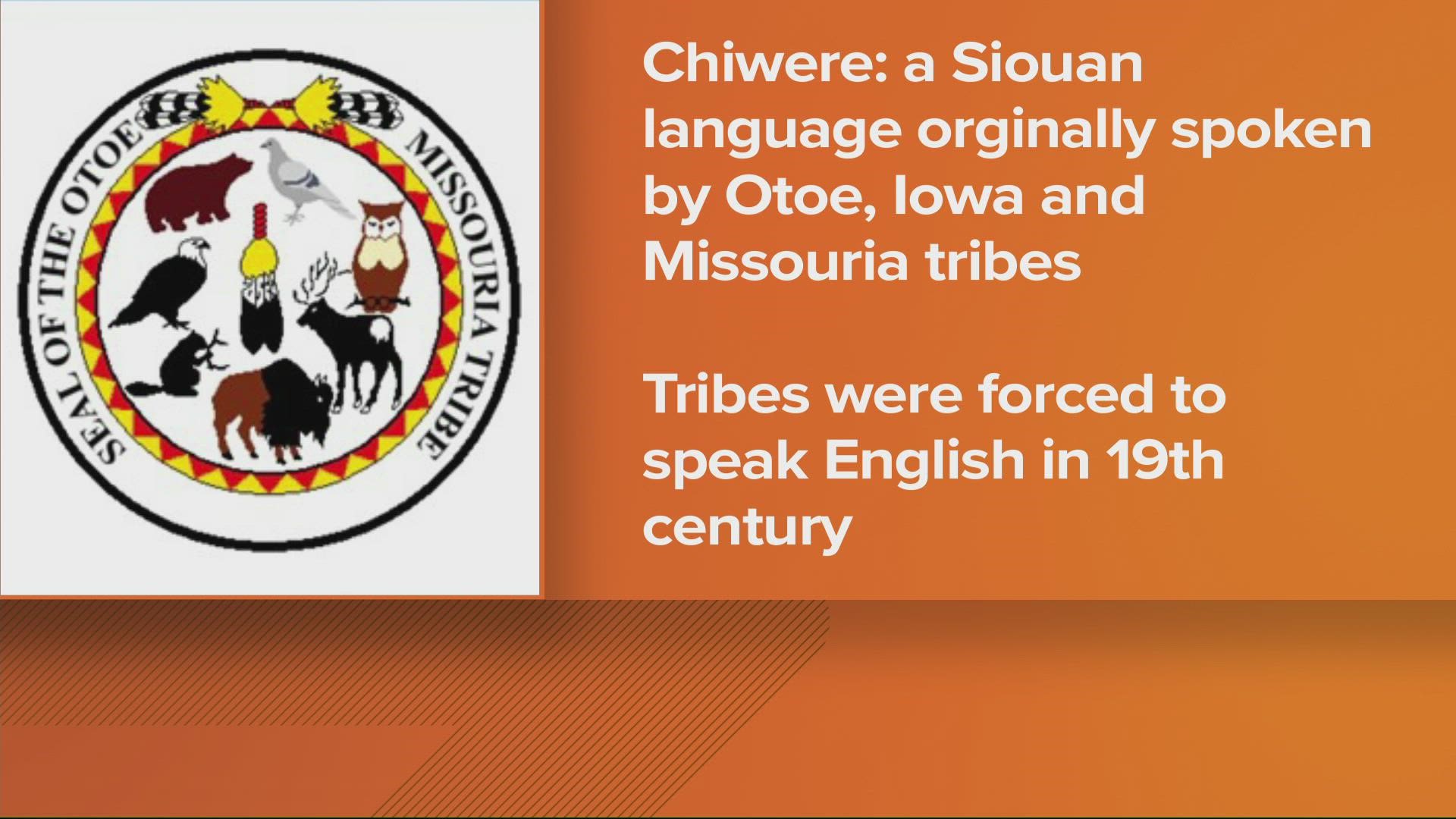KANSAS CITY, Mo. — Before English, French or any European language was spoken in the spot of the map where Missouri sits, Native American tribes brought their own dialects to the region.
One of those dialects was Chiwere, a Siouan language originally spoken by the Otoe, Iowa and Missouria tribes.
It’s an endangered language that researchers and descendants of its speakers are working hard to preserve, KCUR-FM reports.
The Missouria is the tribe behind the state of Missouri’s name. Its people originally came from the Great Lakes region. They were thought to be part of a bigger tribe with the Otoe, Iowa, Winnebago and Ho-Chunk peoples, before they split off and moved south to the area that is now North Central Missouri in the 1500’s.
The Missouria were prolific bison hunters and horse breeders. They controlled the traffic and trade along the Missouri river with other tribes and early Spanish and French colonizers.
The tribe’s original Chiwere name was Nyutachi. But as a result of miscommunication among Native Americans and colonizers, over time it came to be known as Missouria.
The tribe was the first to meet up with Meriwether Lewis and William Clark on their expedition west up the Missouri River in 1804. But by the time the state of Missouri was officially founded in 1820, the tribe was a shadow of its former self.
Smallpox epidemics and an attack from the rival Sac and Fox tribe had killed hundreds of its people. Those who survived joined the Otoe tribe, which for centuries had lived near the mouth of the Platte River in Nebraska.
The 19th Century was a deadly period for indigenous Americans, as the U.S. government carried out forced removal of tribes, theft of Native American land, genocide and forced assimilation.
The Otoe-Missouria Tribe was pushed to a reservation on the Big Blue River in Southeast Nebraska, where its members were forbidden to hunt for buffalo or practice their customs.
According to tribal history, in 1881 they walked with their possessions across the state of Kansas to a reservation in Red Rock, Oklahoma, where they were forced to assimilate and speak English and discouraged from speaking their Chiwere language.
Kennetha Greenwood, an Otoe-Missouria language specialist, says the tribal language became endangered in her own family.
“My mom used to try to get my great grandma to speak to my sisters and me,” Greenwood says. “She was like, ‘no, I don’t want them to get in trouble when they’re in school.’”
Fortunately, Greenwood’s grandmother did share words and songs with her when she was younger. Greenwood is now part of a generation trying to keep the fading Chiwere language alive.
“We’re probably the last generation to actually be able to grow up hearing the language being spoken conversationally, and being able to hear how things were said, the rhythm of the language,” she says.
About 10 years ago, the tribe, which is still based in Oklahoma, started the Otoe-Missouria language department. It offers classes for kids and adults, operates a YouTube channel, and shares “words of the day.”
The department offers a way for the tribe to honor ancestors who helped preserve the endangered language. One of those champions was Truman Washington Dailey, an Otoe-Missouria storyteller.
Dailey was born in 1898. He had Otoe, Missouria and Iowa heritage, making him a fluent speaker of the Chiwere language.
He grew up within his tribe with the teaching of his ancestors. But he also played football and jazz cornet. He went on to work at Disneyland at the Indian Village, which he said he regarded as an opportunity to represent his people.
He and his wife, Lavina, were active in the Native American Church, where Dailey traveled as a roadman and led all-night ceremonies and prayer services across the country.
Dailey went on to testify before Congress for the use of feathers and plants like the cactus peyote to be used in Native American ceremonies. He helped pass the Amendment to the American Indian Religious Freedom Act in 1994.
Jade Roubedeaux, of the Otoe-Missouria language department, says “Grandpa Truman,” as he came to be known by many, created a lasting legacy.
“I always think of him as probably our most knowledgeable historian,” Roubedeaux says. “...in his time and our time today, because we still use him a lot. Even though he’s not here.”
Dailey died in 1996. He was 98 years old, and one of the last fluent Chiwere speakers.
Fortunately, in his last years he worked extensively with researchers at the University at Missouri, who documented the Chiwere language and stories that Dailey knew from his ancestors.
“He was well aware that there were no longer very many people around him who could have a conversation in his mother tongue,” says researcher Lori Stanley.
Dailey received an honorary doctorate from the University of Missouri for his work on the project. And he is revered by a new generation of Otoe-Missouria descendants.
“We’ve been put in a special place to be able to try and carry this language onto another generation,” says Greenwood.
She says it can be a challenge to piece together parts of a puzzle of words, trying to understand some of the deeper meanings and rhythm that were lost when elders like Truman Dailey and her grandmother passed away.
But the work of the language department is paying off. Greenwood says she’s hearing more and more of the language being spoken around the reservation.
“Anytime you can use your language it’s being carried on,” she says.

